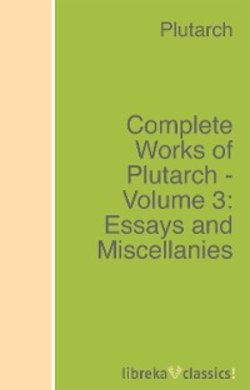Читать книгу Complete Works of Plutarch - Volume 3: Essays and Miscellanies - Plutarch - Страница 14
ОглавлениеOf this number the soul of man is composed; for mind, knowledge, opinion, and sense are the four that complete the soul, from which all sciences, all arts, all rational faculties derive themselves. For what our mind perceives, it perceives after the manner of a thing that is one, the soul itself being a unity; as for instance, a multitude of persons are not the object of our sense nor are comprehended by us, for they are infinite; our understanding gives the general concept of A MAN, in which all individuals agree. The number of individuals is infinite; the generic or specific nature of all being is a unit, or to be apprehended as one only thing; from this one conception we give the genuine measures of all existence, and therefore we affirm that a certain class of beings are rational and discoursive. But when we come to give the nature of a horse, it is that animal which neighs; and this being common to all horses, it is manifest that the understanding, which hath such like conceptions, is in its nature unity. It follows that the number called the infinite binary must be science; in every demonstration or belief belonging to science, and in every syllogism, we draw that conclusion which is in dispute from those propositions which are by all granted, by which means another proposition is obtained from the premises. The comprehension of these we call knowledge; for which reason science is the binary number. But opinion is the ternary; for that rationally follows from comprehension. The objects of opinion are many things, and the ternary number denotes a multitude, as "Thrice happy Grecians"; for which reason Pythagoras admits the ternary. This sect of philosophers is called the Italic, by reason Pythagoras started his school in Italy; his hatred of the tyranny of Polycrates enforced him to abandon his native country Samos.
Heraclitus and Hippasus of Metapontum suppose that fire gives the origination to all beings, that they all flow from fire, and in fire they all conclude; for of fire when first quenched the world was constituted. The first part of the world, being most condensed and contracted within itself, made the earth; but part of that earth being loosened and made thin by fire, water was produced; afterwards this water being exhaled and rarefied into vapors became air; after all this the world itself, and all other corporeal beings, shall be dissolved by fire in the universal conflagration. By them therefore it appears that fire is what gives beginning to all things, and is that in which all things receive their period.
Epicurus the son of Neocles, the Athenian, his philosophical sentiments being the same with those of Democritus, affirms that the principles of all being are bodies which are only perceptible by reason; they admit not of a vacuity, nor of any original, but being of a self-existence are eternal and incorruptible; they are not liable to any diminution, they are indestructible, nor is it possible for them to receive any transformation of parts, or admit of any alterations; of these reason is only the discoverer; they are in a perpetual motion in vacuity, and by means of the empty space; for the vacuum itself is infinite, and the bodies that move in it are infinite. Those bodies acknowledge these three accidents, figure, magnitude, and gravity. Democritus acknowledged but two, magnitude and figure. Epicurus added the third, to wit, gravity; for he pronounced that it is necessary that bodies receive their motion from that impression which springs from gravity, otherwise they could not be moved. The figures of atoms cannot be incomprehensible, but they are not infinite. These figures are neither hooked nor trident-shaped nor ring-shaped, such figures as these being exposed to collision; but the atoms are impassible, impenetrable; they have indeed figures of their own, which are conceived only by reason. It is called an atom, by reason not of its smallness but of its indivisibility; in it no vacuity, no passible affection is to be found. And that there is an atom is perfectly clear; for there are elements which have a perpetual duration, and there are animals which admit of a vacuity, and there is a unity.
Empedocles the Agrigentine, the son of Meton, affirms that there are four elements, fire, air, earth, and water, and two powers which bear the greatest command in nature, concord and discord, of which one is the union, the other the division of beings. Thus he sings,
By Jupiter he understands fire and ether, by Juno that gives life he means the air, by Pluto the earth, by Nestis and the spring of all mortals (as it were) seed and water.
Socrates the son of Sophroniscus, and Plato son of Ariston, both natives of Athens, entertain the same opinion concerning the universe; for they suppose three principles, God, matter, and the idea. God is the universal understanding; matter is that which is the first substratum, accommodated for the generation and corruption of beings; the idea is an incorporeal essence, existing in the cogitations and apprehensions of God; for God is the soul and mind of the world.
Aristotle the son of Nichomachus, the Stagirite, constitutes three principles; Entelecheia (which is the same with form), matter, and privation. He acknowledges four elements, and adds a certain fifth body, which is ethereal and not obnoxious to mutation.
Zeno son of Mnaseas, the native of Citium, avers these to be principles, God and matter, the first of which is the efficient cause, the other the passible and receptive. Four more elements he likewise confesses.
